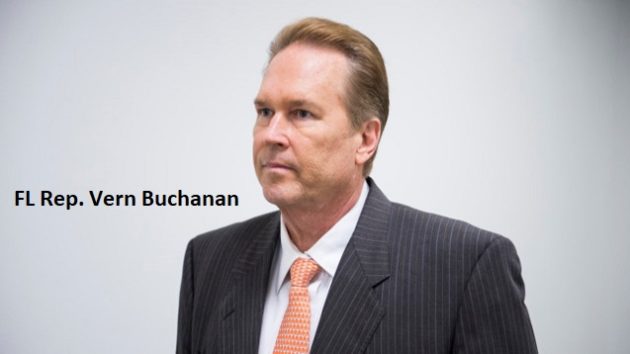Republican Rep. Vern Buchanan (FL-District 16) sends out unscientific, biased survey on drilling in Gulf of Mexico
On April 19th, 2011, one year after the Deepwater Horizon incident, CNN released a national poll on offshore drilling. CNN reported that their scientific poll found:
One year after the disastrous oil spill in the Gulf of Mexico, support for offshore oil drilling has rebounded despite concerns that the federal government cannot prevent another massive oil spill, according to a new national poll.
[ … ]
“Although support for increased drilling in U.S. waters is highest among Republicans, a majority of Democrats also favor it,” says CNN Polling Director Keating Holland. “Fifty-six percent of Democrats favor more offshore drilling, compared to 70 percent of independents and 86 percent of Republicans.” [Emphasis added]
At the start of March, 2017 U.S. Interior Sec. Ryan Zinke announced that 73 million acres in the Gulf would be open to drilling for five years starting in August. Up for reelection Republican Representative Vern Buchanan (FL – District 16) sent out the below in email on Sunday, January 7, 2018.

Buchanan’s email survey is seriously flawed in four ways. First, the survey is unscientific. Second, respondents have no way of knowing who got the email and their level of knowledge on the topic of drilling for oil and natural gas in the Gulf Coast. Third, an individual on our staff answered the survey multiple times without be told that he had already voted. Fourth, the second possible answer to the question invokes the “precautionary principle.” Perhaps a better survey would have asked:
Do you support or oppose drilling for oil and natural gas off Florida’s Gulf Coast?
- SUPPORT…we need all the oil and natural gas we can produce.
- OPPOSE..we do not need all the oil and natural gas we can produce.
Conclusion: The results of the survey cannot be used as a basis to form public policy on offshore drilling.
Does Buchanan’s unscientific and biased survey change anything?
The answer is no!
In January, 2011 Fortune magazine published an article titled “A short history of drilling in the Gulf of Mexico” by Doris Burke. Burke in his article asked: Who’s gulf is it? The answer:
Drilling was so lucrative that governmental squabbles developed over who owned the rights. The fight was resolved when [Republican] President Eisenhower signed the Submerged Lands Act in 1953, giving states most rights to natural resources within three miles from their coastlines. The feds could then auction leases for gulf blocks outside the states’ jurisdiction. [Emphasis added]
Today more than 80% of the oil produced in the Gulf of Mexico comes from deepwater wells located more than three miles off of Florida’s coast line.
The Submerged Lands Act was enacted in response to litigation that effectively transferred ownership of the first 3 miles of a state’s coastal submerged lands to the federal government. In the case United States v. California (1947), the United States successfully argued that the three nautical miles seaward of California belonged to the federal government, primarily finding that the federal government’s responsibility for the defense of the marginal seas and the conduction of foreign relations outweighed the interests of the individual states.
Former President Obama on December 20th, 2016 permanently banned oil and gas drilling in portions of the Arctic and Atlantic as a “poke” at then President elect Trump according to Politico. Dan Naatz of the Independent Petroleum Association of America said, “With exactly one month left in office, President Obama chose to succumb to environmental extremists demands to keep our nation’s affordable and abundant energy supplies away from those who need it the most by keeping them in the ground.”
Does it not make more sense and does it not potentially make it safer to drill closer to the Gulf of Mexico shorelines?
It appears that Rep. Buchanan is, like Obama, poking at President Trump and pandering to environmental extremists.
On his Facebook page Buchanan wrote, “Honored to have the endorsement of Oceans Champions.” But who is Ocean Champions?  According to its website:
According to its website:
Ocean Champions is a 501(c)(4) organization with a connected political action committee – the first national organization of its kind focused solely on oceans and ocean wildlife. Our goal is to create a political environment where protecting and restoring the oceans is a national government priority.By helping to elect pro-ocean Congressional candidates and engaging with Congress to pass pro-ocean laws and shoot down bills that would harm the ocean.
What does Ocean Champions mean by having a goal to “create a political environment where protecting and restoring the oceans is a national government priority” and to “pass pro-ocean laws and shoot down bills that would harm the ocean?”
Under the Obama administration this meant implementation of the National Ocean Policy on July 19, 2010, known as “Ocean Zoning.” This policy was fully supported by Ocean Champions and twelve other environment groups.
Florida politicians are addicted to the precautionary principle (“better safe than sorry”). It is a maxim embraced by government planners and regulators in the Sunshine state at every level. They do not even want to determine what organic fossil fuels lay off of Florida’s coastlines. The precautionary principle worked to stop the building of nuclear power plants in the United States after the 3 Mile Island incident. Today the same tactic is being used to stop off shore drilling using the Deepwater Horizon incident.
Fear is not good public policy.
What is good public policy is insuring that Floridians have access to cheap and reliable power in the foreseeable future. Now is the time to take action. Waiting is not an option.
If the Florida delegation are committed to creating jobs, then they must diversify the economy by promoting energy independence. Energy independence will lead to reduced costs for electricity, gasoline and diversify the economy.
That is good public policy. This is the moral thing to do.
EDITORS NOTE: According to the U.S. Energy Information Administration:
- Geologists believe there may be large oil and natural gas deposits in the federal Outer Continental Shelf off of Florida’s western coast.
- Florida was second only to Texas in 2014 in net electricity generation from natural gas, which accounted for 61% of Florida’s net generation; coal accounted for almost 23%, the state’s nuclear power plants accounted for 12%, and other resources, including renewable energy, supplied the remaining 4% of electricity generation.
- Renewable energy accounted for 2.3% of Florida’s total net electricity generation in 2014, and the state ranked 10th in the nation in net generation from utility-scale solar energy.
- In part because of high air conditioning use during the hot summer months and the widespread use of electricity for home heating during the winter months, Florida’s retail electricity sales to the residential sector were second in the nation after Texas in 2014.
- Electricity accounts for 90% of the site energy consumed by Florida households, and the annual electricity expenditures of $1,900 are 40% higher than the U.S. average, according to EIA’s Residential Energy Consumption Survey.



Leave a Reply
Want to join the discussion?Feel free to contribute!